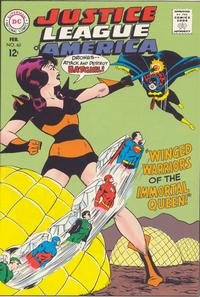Following the lead of
Vincent Murphy at
Spandex Justice (though he got the idea from
someplace else) here's my own act of personal archaeology...
The earliest DC comic I can remember reading was
Justice League of America issue #60.

I suspect my early exposure to this comic may have made me a sexual pervert. Certainly, the cover imagery is powerful in terms of the developing libido of the prepubescent male mind. Adult men reduced in size, with a domineering woman towering over them and controlling them -- talk about sublimated maternal imagery! But the Queen Bee is a
bad mommy, and sees other women as a threat to her supremacy: see how she orders her "drones" to attack Batgirl, who for all we know might be immune to the Queen Bee's control simply because of her gender.
Oy. I'm lucky this comic didn't make me
gay.
(On the other hand, the art -- including the cover -- was by
Mike Sekowsky, who drew the most
absolutely gorgeous women ever seen in comics to this day. I would
totally do the Queen Bee.)
I haven't read this comic since it was new, and I'd have to guess at the whys and wherefores of the plot. I certainly have no idea what weirdness it may have deposited in my subconscious. But I must have liked something about it, because I went on from there to seek out more comic books as single-mindedly as any drone bee seeking pollen...
Mind you, I didn't actually choose that comic or buy it myself; I expect one of my parents bought it for me as a gift. Before then, I would only have known these superheroes from Saturday morning cartoons. But both my parents had read comics as children themselves, and apparently saw no harm in introducing me to the medium; certainly none of the standard prejudice that comic books would keep me from reading "real" books existed in our household. But the earliest comic book I can remember actually picking out from a rack and asking if I could have it is
Superboy #147.

Seen through adult eyes, it's a staid cover -- I've even heard it described as boring, which offends me irrationally -- but I remember how it looked at the time. The Neal Adams embellishments over a layout by Curt Swan, especially the shading on the bustlike heads along the sides, seemed positively
photorealistic compared to anything I'd seen before in a comic book. When I saw this cover again for the first time after several decades, I was surprised to see that it hadn't actually been a
painted cover as I mistaken recalled it must have been, and that it was actually fairly ordinary in production values. At the time, it seemed to me singularly moody and elegaic -- I thought perhaps a character had died (perhaps even Superboy himself?) and the oddly lit faces were paying tribute to a fallen hero.
And then the banners the other figures were carrying -- well, they promised
several stories in this issue, and that meant this comic had to be worthwhile...even if it was priced at the exorbitant sum of 25 cents, far more than the usual comic book.


